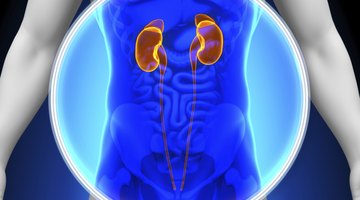Antihistamines to Relieve Ear Pressure
Ear pressure is commonly the result of fluid buildup in the middle ear, or pressure from an infection or allergic reaction, notes MayoClinic.com. Antihistamines are used to treat allergies and to reduce the amount of sinus mucus. Antihistamines that can alleviate ear pressure include diphenhydramine, doxylamine and loratadine, according to FamilyDoctor.org. These have various side effects and classifications for pregnant or breastfeeding women, and should not be used without first consulting a doctor.
Diphenhydramine
Diphenhydramine, or Benadryl, is an older antihistamine that is very powerful and effective at reducing the amount of fluid throughout the head, according to Drugs.com. The most significant side effect of this drug is sleepiness. Diphenhydramine users should not operate heavy machinery or drive a vehicle. Other side effects are dry mouth, dizziness, headaches and difficulty urinating, according to Drugs.com. Stomach ulcers, hyperthyroidism, asthma heart problems or glaucoma are all conditions that can be negatively affected by this antihistamine, and those suffering from these conditions should discuss the drug's use with their doctor.
Doxylamine

Antihistamines for Pregnancy
Learn More
Doxylamine, an active ingredient in NyQuil, is considered a first-generation antihistamine, according to FamilyFoctor.org. Doxylamine is used as single drug or in combination with other drugs, depending on the symptoms. This drug is not recommended for children under 2, and should be used with caution for children over 2. Doxylamine should be taken with caution by those with kidney disease, an enlarged prostate, bronchitis, stomach ulcers or glaucoma. This drug also causes severe drowsiness which can lead to difficulty paying attention. It should not be used while operating a vehicle or machinery.
Loratadine
Loratadine, brand name Claritin, is a newer antihistamine used prevent and treat ear pressure due to allergies, according to FamilyDoctor.org. Loratadine is available over-the-counter and typically comes in a single 24-hour dose. This drug does not cross into the brain, and therefore does not cause drowsiness in healthy adults. Those with kidney or liver disease should talk with a health care provider before taking this drug. Loratadine is most effective when taken consistently over a few days, and takes up to two hours before affecting the body, according to Drugs.com.








